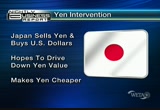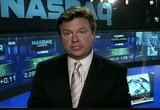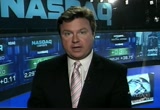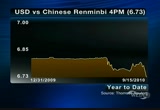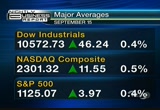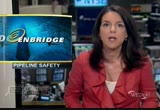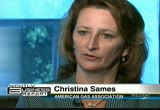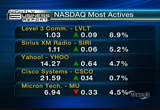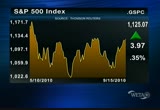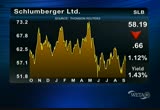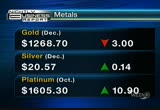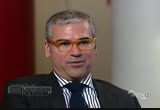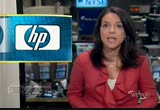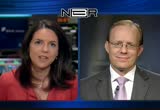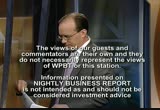tv Nightly Business Report PBS September 16, 2010 12:30am-1:00am EDT
12:30 am
that's the goal of japan's intervention today in the currency markets. but will the move help boost japan's economy, and what does it mean for big international companies and their shareholders? you're watching "nightly business report" for wednesday, september 15. this is "nightly business report" with susie gharib and tom hudson. "nightly business report" is made possible by:
12:31 am
this program is made possible by contributions to your pbs station from viewers like you. captioning sponsored by wpbt >> tom: good evening, everyone. susie gharib is off tonight. i'm joined by suzanne pratt. japan moved today to weaken its currency as the dollar hit a 15- year low against the yen. suzanne, it's an effort to help the lagging japanese economy. >> suzanne: tom, this is japan's first intervention in the currency market in six years. it comes just ahead of a meeting between president obama and japan's prime minister in new york city next week. so exactly what did japan do? the country's treasury sold its own currency, the yen, and bought u.s. dollars.
12:32 am
the idea is to drive down the value of the yen versus the dollar, making japan's currency cheaper. >> wolfgang koester is the c.i.a. at a firm that. welcome back to "nightly business report." what companies do you think get hurt by this japanese yen intervention? >> the people that are going to get hurt are the people that are looking to -- that have costs in japan, more than the people that are looking at the revenues. what is really important is for corporations and their investors to understand where the corporations have the exposures on the revenue, as well as the costs. for example, net exposure side. >> tom: so when you're talking about the cost side, these are companies that have some kind of manufacturing or services based in japan that could get hurt by this intervention, right? >> precisely. that's absolutely correct. that's what we're seeing at fireapps.
12:33 am
we're seeing companies coming and looking and trying to see how this yen appreciation impacts them, and there is a focus on the second part of this, which is the cost focus. >> tom: i imagine automotive companies based in japan, and even software companies and technology hardware companies could get hurt by this? >> yes. absolutely correct. it is going to be widespread. what is really important for investors to recognize here, it isn't all about dollar/yen. they need to understand how currencies in general will impact the value of the company. >> tom: wolfgang, this intervention worked for a day. and we see the move on the far right-hand side of the screen. but when you pull out to a 15-year monthly chart, you see clearly what has been going on in the last 15 months. what has been driving the yen rally against the dollar? >> i think there are some japanese fundamentals that looked a little promising. and there has been also a lot of speculation of when
12:34 am
is the central bank going to intervene, and let's test that, and that's when you started to see them really pushing for an appreciation to the point where the japanese started last week already making noise about intervention, and then them starting it today. what you see here is that they're really creating a ceiling, and you didn't see a very large move of an appreciation of the dollar against the yen. you only saw about a one and a half yen move. >> tom: wolfgang, japan, like the united states and europe are looking for a cheaper native currency to try to grow their way out of this economic mal laz, but they all can't win, can they? >> no. they can't all win. all you ever see is the g-3 or g-10s trying to make sure that the market moves in an orderly fashion. not just by everybody trying to appreciate. >> tom: less than a minute here, but i want to get your thoughts on the chinese re re remimbi, and the
12:35 am
narrow change it has been in against the dollar for many, many moons. how are companies that do big business in china, like young brands on immentd looking at this. >> they're looking at this, and the ones that have a lot of revenue are hoping they're going to appreciate and let the currency have a free-for-all. you're seeing that the companies having the costs in danger of having a significant increase in costs, but benefiting their trade deficit, i guess i should say. >> tom: sure. certainly one to watch here as it has been a low volatile environment, at least for the chinese currency, but politically, lots of volatility. and wolfgang, we appreciate you being here. he is the c.e.o. of fireapps. >> tom: here are the stories in tonight's n.b.r. newswheel: stock investors were optimistic today, despite japan's move on
12:36 am
the yen. the dow rose 46 points, the nasdaq added 11.5 and the s&p 500 was up nearly four. trading volume was about the same as yesterday's levels on both the big board and the nasdaq. industrial production rose for a second straight month in august, but the 0.2% increase was smaller than expected. the world trade organization has found boeing received over $20 billion in illegal subsidies from the u.s. department of defense and nasa. the ruling calls for those subsidies to be withdrawn. boeing maintains that any aid it received falls far short of the help its european rival, airbus, gets. goldman sachs is being sued for allegedly paying and promoting female managers less than their male counterparts. goldman says the suit is without merit. >> tom: still ahead, the list is in and you're no doubt familiar with the winners. we look at the world's top brands, and what makes them so special. >> suzanne: the recent deadly gas explosion in california involving pg&e has many people wondering if natural gas and oil
12:37 am
pipelines in their communities are safe. the obama administration is moving to reassure them. it wants to add new inspectors and beef up safety standards. but, as stephanie dhue explains, it could be a slow process. >> with public attention focused on the natural gas pipeline explosion in san bruno, california, that killed four people and wiped out a neighborhood, the obama administration now wants to boost pipeline safety. but, safety advocate rick kessler says its proposal comes up short. >> i think we have a moment here, and we owe that to the people who lost their lives and the people who are without homes and the people who are looking for lost family members to do something real. and this doesn't get us there. >> reporter: the administration proposes increasing enforcement and inspection staff at the pipeline and hazardous materials safety administration. it also wants to raise the maximum penalty for safety violations from $1 million to $2.5 million. safety advocates want the agency
12:38 am
to do a better job informing the public about potential problems, and to boost safety inspections. critics say the agency also has to change its culture. case in point: the agency head, cynthia quarterman, used to be an attorney for enbridge. >> the oil company has had two the oil company has had two significant pipeline leaks in recent months. quarterman has recused herself from issues involving the company, including testifying before congress. deputy transportation secretary john porcari defended her today, before the house transportation committee. >> we selected an administrator that had both public and private sector experience. >> reporter: republican bill shuster says it's probably too late for congress to pass legislation this year. >> i don't see there's any way that we can go through a proposal and pass a proposal that's going to make sense, that's going to be thoughtful, that's going to look at the facts. >> reporter: that would be fine with the industry. the american gas associaton, which represents pipeline firms, says there's already a lot of regulation underway. >> i think a slower approach
12:39 am
allows congress to really take a look at what are causing these safety issues and to think reasonably how to address them. >> reporter: lawmakers don't have much time if they want to make changes this year. the house is expected to adjourn in early october so members can focus on the mid term election. stephanie dhue, "nightly business report," washington. will name this week harvard law professor elizabeth warren to a special advisor position, overseeing the consumer financial protection bureau. she has long been considered the frontrunner to leave this position. reports say warren will not be nominated to that role, and that she'll report to both the president and the treasury secretary.
12:40 am
>> so tom, the talk today was all about currencies and gold, but still stocks had a pretty good day. >> tom: they did have a good day, inching higher. let's look at tonight's "market focus". >> tom: the gains may have been small today, but they were enough to push the indices to five-week highs. the s&p 500 sits just below its high from the july rally. this is the third time the index has traded around these levels in the past six months. the past two times, it failed to
12:41 am
move higher. one sector that has already eclipsed its highs from earlier this summer is healthcare. this healthcare exchange traded fund is above $30 per share for the first time since may. pharmacy suppliers led the way-- mckesson, amerisourcebergen and cardinal health rallying on heavy volume. mckesson backed its financial guidance, even though volumes are slowing. together, these three control around 90% of the pharmaceutical distribution business in the u.s. one would think these are good times to be a gold miner, what with gold hitting record highs this week. but if a miner made commitments to sell its gold years ago, the higher price doesn't help. anglogold faces this with its hedging position. it locked into sales contracts valuing gold at an average of $450 an ounce. today, gold is close to $1,269 an ounce. to take advantage of the much higher selling price, it is selling stock and convertible
12:42 am
bonds, raising money to get out of those old deals. the additional shares pushed the stock lower, dropping almost 5% on heavy volume. the stock is essentially at the same price it was a year ago. while we're talking about commodities, the government has ordered old oil and natural gas companies to permanently plug thousands of wells in the gulf of mexico and dismantle hundreds of abandoned platforms. a quartet of oil well service stocks jumped on the possibility of new work coming in the months ahead. superior energy, tetra, global industries and cal dive all saw big volume on these rallies today. these stocks had fallen significantly off their april highs thanks to the deep water drilling moratorium after the b.p. oil disaster. that same moratorium is to blame for anadarko petroleum canceling a drilling contract with diamond offshore. diamond is fighting the cancellation, saying the moratorium is not an act of god, as anadarko claims it is, freeing it from the deal. one other note from energy, schlumberger saw heavy volume on
12:43 am
a 1% drop. in a filing today, it says the drug war violence in mexico is hurting its business, especially in the natural gas-rich area of northern mexico. earlier this week, we mentioned that more companies were out talking about their business outlooks. a trio of warnings today. homebuilder beazer says it may miss order expectations this quarter. the stock fell 7%. steel maker a.k. steel fell almost 6%, forecasting an operating loss this quarter. remember, just yesterday nucor steel had a warning of its own. and brocade communications dropped 4%. it expects weaker margins due to lower prices for its computer networking gear. and that's tonight's "market focus."
12:44 am
>> suzanne: of all the brands in the world, which is the best? it seems like an difficult question to answer. but the consulting firm interbrand is out with its annual rankings of the top 100 global brands. erika miller highlights a few of this year's winners, and why their strategies are working. >> reporter: think of interbrand's list as the oscars of business branding. this year, most companies on the list were able to boost their brand values, unlike last year. interbrand's jez frampton says that's a positive sign the economy is improving. >> what this shows is that the companies who own these brands are performing well. the brand value doesn't increase if their business doesn't perform, because brands and businesses are interlinked. >> reporter: coca-cola ranked
12:45 am
number one for the 11th year in a row. but half the top ten are technology companies this year-- including i.b.m., microsoft, google, intel and h.p. microsoft's david webster credits his firm's high ranking partly to improvements in popular products, like windows and office. >> if every year we ship a better version of a product people already know and love, that just increases satisfaction and momentum for the brand. the second thing that we do is create new products and brands in spaces that are rapidly growing. >> reporter: speaking of growing, j.p. morgan's brand value rose this year, in contrast to competitors like u.b.s. and citi. j.p. morgan's kristin lemkau explains what her firm did differently. >> i think we were able to be in a position of strength-- to be a strong port in the storm coming out of the financial crisis. and at a time when other banks were not able to provide capital to their clients, we could. >> reporter: heineken made the list for the first time ever-- at number 93.
12:46 am
heineken's alexis nasard says his firm is doing a better of job of reaching customers in unexpected ways. >> here we want to be part of their lives and of their experiences. and this is what we do in things like, you know, the champions league, things like the u.s. open. also through a lot of our viral marketing campaigns. >> reporter: so what can smaller businesses learn from this year's list? what strategies are working? >> our expectations as consumers are changing quite considerably. if a brand makes a promise to you-- like starbucks' that it's offering you that third place between home and work-- then it has to live up to it, in absolutely every detail, of that service and its product. >> reporter: there's also a lesson from b.p.'s failure to make the list this year. interbrand says b.p.'s mistake was focusing on clean-up tactics in the gulf, instead of emphasizing company values like environmental leadership. erika miller, "nightly business report," new york.
12:47 am
>> suzanne: hewlett-packard was number ten on interbrand's list. h.p. has been making news with a series of acquisitions and the abrupt departure of its c.e.o. mark hurd. yesterday, that turmoil in the executive suite had the c.e.o. of rival i.b.m. talking down h.p. today, h.p.'s chief marketing officer, michael mendenhall, took on big blue. he talked with our scott gurvey, who began by asking if mendenhall was a candidate for h.p.'s top job. >> no, my hat is not in the ring, but, it is very kind of people to sort of suggest that. the board is out doing a search. i am not -- i did not put my hand up. i'm not interested in that role at this point. i still haven't finished all i've set out to do as a chief marketing officer for hewlett-packard. >> does it present -- hewlett-packard just had two c.e.o.s now who have left under some difficult circumstances. does it present a problem when it comes to looking at the brand? >> no. i don't think so. i don't think any one person sort of makes a
12:48 am
brand. a brand is made over decades. if not, years, and multiple years. and i think the work we've been doing at h.p., certainly over the last three to five years is paying out now in dividends, relative to brand strength, brand value for the company. >> sam panazano, the c.e.o. of ibm, who doesn't make a lot of public announcements, had a bunch of couple not so nice things to say about h.p. obviously, you disagree. >> yeah. i think we're about focused innovation. innovation with purposeful intend. i think sam's comments validate, and i had a big smile on my face, we are a legitimate contender to ibm. there were many, many years that went by that ibm never mentioned us. they're mentioning us now. what we know through their last earnings period, their revenue was down, and we also know we had a terrific quarter. i think the performance
12:49 am
speaks for itself, and certainly his comments validate that we're a legitimate competitor, legitimate threat to bel's revenues and margins. >> another thing that is true, with the compact acquisition and added to the product line you already had, you're a consumer p.c. company, which a lot of other companies are not. do you have any problem, going back to the brand, this wide range of customer base? >> i think what we see is convergence as a trend in the i.t. technology base. we've been fundamentally building out and focused on a 10-year strategy that we continue to stay focused on as management in the company today. most people don't realize we're the 6th largest computer company in the world. if i were ibm, i'd be concerned. we wrapped that now in the hardware. it gives you unbelievable capability sets. we then go out and acquire
12:50 am
3com, and add it to procurve, with a great set of capabilities and networking. for the first time cisco is going to find themselves under revenue pressure from h.p. >> and storage and security? >> storage and security. we have organically grown certain pieces of this through h.p. labs, and we've also looked at m & a to bring scale, very rapid scale. and we scale now globally, we're the largest i.p. company end to end. you can outsource everything to us, and piece to us. we can integrate for you and provide you with the hardware and software to meet your needs. we can provide were you you with consumer insights, and your web capabilities and ecommerce capabilities. and i think, for the first
12:51 am
time you're going to find some of these companies who haven't had very stiff competition, will go unnamed, will find h.p. at their doorstep. >> very good. i thank you. >> thank you. >> tom: here's what we're watching for tomorrow: quarterly results from fedex, oracle and research in motion, along with the producer price index for august. treasury secretary timothy geithner testifies to a senate committee on exchange rate policies. also tomorrow, going after gamers. retailer gamestop launches a new online strategy to fend off bigger competition in the brick- and-mortar world. >> suzanne: u.p.s. is making waves in the shipping industry. today, the delivery giant launched a new ocean freight service. the move highlights the importance u.p.s. is placing on international business, while its domestic sales remain weak. the new service is available between the u.s. and japan. it will be extended to other parts of asia over the next six months. but forget about overnight, u.p.s. says it will take up to 18 days to send packages by ship
12:52 am
12:53 am
>> suzanne: in the "money file" tonight, being charitable and tax savvy. here's charles bennett sachs, wealth manager at evensky and katz. >> what could possibly feel better than making that big donation to your favorite charity? how about getting two tax breaks instead of just one? donate cash to charity and you'll likely get an income tax deduction. but donate a security you've held at least a year... and in addition, any capital gain you would have been subject to simply vanishes. most folks know about this second tax break, but few take advantage of it. the main reason i've found is that they're just not ready to part with the security. well, here's a solution that allows you to keep the security
12:54 am
and make the capital gain liability disappear. its called charitable gain harvesting, and here's how it works. step one is to identify a long- term holding with a large gain. step two is to deposit the cash you were going to use as your donation into your brokerage account. for step three, transfer to the charity enough shares in the identified holding to meet your donation. and finally for step four, with the cash you transferred in, repurchase the same number of shares that you just donated. and just like that, your donation is for the fair market price of the shares. by repurchasing shares you still hold the position, and now your cost is fair market value, so the unrealized gain has vanished. please see my nightly business report blog on charitable gain harvesting which explains this strategy in more detail along with some things to watch out for. so be charitable and tax savvy. i'm charles bennett sachs. >> suzanne: that's "nightly business report" for wednesday,
12:55 am
september 15. i'm suzanne pratt. good night everyone, and good night to you too, tom. >> tom: good night suzanne. i'm tom hudson. good night everybody. we'll see all of you again tomorrow night. "nightly business report" is made possible by: this program was made possible by contributions to your pbs station from viewers like you. captioning sponsored by wpbt captioned by media access group at wgbh access.wgbh.org
12:56 am
344 Views
IN COLLECTIONS
WETA (PBS) Television Archive
Television Archive  Television Archive News Search Service
Television Archive News Search Service 
Uploaded by TV Archive on

 Live Music Archive
Live Music Archive Librivox Free Audio
Librivox Free Audio Metropolitan Museum
Metropolitan Museum Cleveland Museum of Art
Cleveland Museum of Art Internet Arcade
Internet Arcade Console Living Room
Console Living Room Books to Borrow
Books to Borrow Open Library
Open Library TV News
TV News Understanding 9/11
Understanding 9/11

